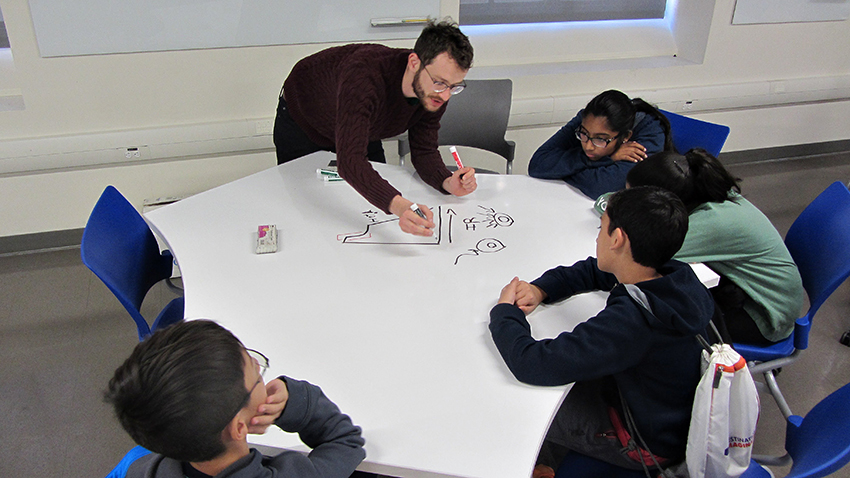Two programs at UT are activating student curiosity with real-life, hands-on learning.
The “Shadow a Scientist” and “Present your Thesis to a 12 year Old” programs aim to connect the community to current scientific work at UT and raise awareness about the importance of science communication. The programs hope to get undergraduates, graduates, post-docs and even professors actively involved in communicating their fields to the public.
Students signed up for the Freshman Research Initiative-sponsored “Shadow a Scientist” program can expect a two-hour guided tour of an active research lab. On each tour, scientists teach basic laboratory skills and talk about their research. Middle school students populate labs during the summer and flock in pairs to areas tailored to their interests. A student interested in marine biology, for example, might explore the complexities of aquatic life with an educator from the “Fish Behavior” lab.
Shadowing scientists engages young students in experiential, inquiry-based learning, according to a 2016 Plos biology publication by the FRI outreach program, a paper intended to make other scientists aware of this type of outreach.
Greg Clark is a plant biologist and senior distinguished lecturer in molecular biosciences at UT. He is also a Research Educator in FRI and directs K-12 outreach.
“With inquiry-based learning (such as in the “Shadow a Scientist” program), you need to be doing hands-on activities,” Clark said. “The idea is you’re learning because you’re interested in solving a problem or interpreting data. It changes the way you learn. Compare that to being in a classroom.”
Fourth-year graduate student Pallavi Kompella researches the effects of obesity on secondary DNA structures. She also takes kids on tours of her lab with the Shadow a Scientist program during the summer. She said the students take interest in the labs, where what they read in books is applied and improved upon.
Her experience in outreach helped her secure the Compass Outreach grant from the American Society of Cell Biology to organize a “Kids Science Workshop” at UT in Dec. 2017.
Third-year graduate student Lucy Leblanc studies cell death and differentiation in stem cells. She also participates in outreach activities put on by the “Present your Thesis to a 12 Year Old” program, which connects UT graduate students with Austin middle schools. She gives presentations at Kealing Middle School and helped students in the Kids Science Workshop.
Presenting to the students challenged her communication skills, especially in regard to narrowing it down to the most critical part of her research, Leblanc said.
“It reminds me why I’m doing what I’m doing,” Leblanc said. “I always have to go back to the fundamental questions, and that’s important because when you communicate with other scientists, they care about the bigger question that you’re answering.”
Graduate students, post-docs and professors compete for limited grant money. Grant proposals that secure funding express only pertinent information about the research and discuss important, overarching questions the work helps to answer. Presenting to kids helps researchers such as Leblanc, who need to set themselves apart.
“I got a research grant from the National Science Foundation partially because of all the outreach I did as a undergrad and graduate,” Leblanc said.
Research scientists try to maximize their time in the lab. Taking an hour or two out of such a busy schedule to do outreach and build these skills might seem impossible to someone already committed to making discoveries.
For Kompella, spending time away from the lab to do outreach is worth the sacrifice.
“You’re coming out of your comfort zone to do it, but it’s worth it,” Kompella said.
Clark said he believes outreach and communication should be a part of a scientist’s job description.
“I hope this next generation understands that part of being a scientist is communicating science and doing outreach,” Clark said. “That’s how we’re going to change things in the future.”















